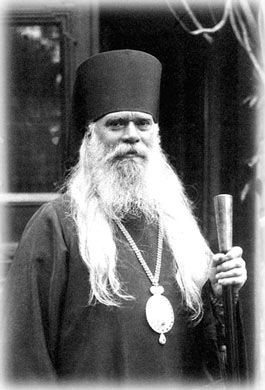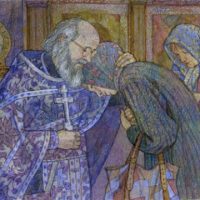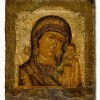Given in the Russian Orthodox Church of St. Paraskeva in Sofia, Bulgaria, on February 18 / March 3, 1946.
 The scribes and Pharisees once condemned and reproached the Lord for eating and drinking with publicans and sinners. To this the Savior said: I am not come to call the righteous, but sinners to repentance (Matthew 9:13). From these words of Christ it is evident that the purpose of His coming into the world was our repentance. If repentance was the purpose of Jesus Christ’s coming into the world, then it is clear that we, too, ought to consider repentance the purpose of our entire lives and all our labors.
The scribes and Pharisees once condemned and reproached the Lord for eating and drinking with publicans and sinners. To this the Savior said: I am not come to call the righteous, but sinners to repentance (Matthew 9:13). From these words of Christ it is evident that the purpose of His coming into the world was our repentance. If repentance was the purpose of Jesus Christ’s coming into the world, then it is clear that we, too, ought to consider repentance the purpose of our entire lives and all our labors.
This makes sense, for it is only through repentance that the Lord grants us the greatest heavenly treasure: the regenerating grace of the Holy Spirit, which we receive in the Mystery of Chrismation at Holy Baptism. This grace in us is the source of divine conduct. It helps us distinguish good from evil. It provides all knowledge necessary for the happiness of our temporal life and for the life of the future. This is why St. John the Theologian, referring to the grace of Chrismation received at Holy Baptism, said: But ye have an unction from the Holy One, and ye know all things… and ye need not that any man teach you: but as the same anointing teacheth you of all things (1 John 2:20, 27).
This grace is nothing other than the divine power that indeed helps us to renounce Satan and all his affairs – sins and passions – and to live according to God’s commandments, thereby receiving a foretaste even here of the future blessedness of Christ’s Heavenly Kingdom. This is why another great Apostle, Paul, called this grace the earnest (guarantee) or portion of the future inheritance, which is the ineffable eternal blessedness of Paradise (cf. 2 Corinthians 1:22; 5:5).
Both repentance and grace are clearly two goods necessary for salvation, for without repentance one cannot receive the regenerating grace of Holy Baptism, which is why the Apostle Peter, in response to the question posed by the audience of his first missionary sermon – what shall we do? – said: Repent, and be baptized every one of you in the name of Jesus Christ for the remission of sins, and ye shall receive the gift of the Holy Spirit (Acts 2:38). The extent to which we will repent is the extent to which the Holy Spirit’s wondrous actions of grace will be in us.
Beloved, we all know how great the repentance of St. Mary of Egypt was. But consider just how much grace she had from God! When St. Zosima awaited Mary at the Jordan with the Holy Gifts in order to give her Communion, he wondered how she would come to him from the other side of the river. Then he saw how she, like Jesus Christ, walked on water as on dry land, thereby crossing the Jordan. When St. Zosima asked Mary to pray for the entire world, she was raised into the air as she offered fervent prayer to God. By this astonishing miracle the Lord demonstrated to St. Zosima that the prayer of this great and righteous woman for the preservation and salvation of the world was acceptable to God. The world did not know, and to this day still does not know, that it is preserved from ruin by the grace of a few great righteous ones.
Thus did the Lord once preserve the world through the prayers of one of His holy ones: St. Mark of Trache. Thus did the Lord preserve the world from ruin by the prayers of two of His venerable ones: Macarius the Great and Macarius of Alexandria, for their struggle of repentance was so great; and great, too, was their grace.
That wondrous God-pleaser, St. Seraphim, had no grave sins. He experienced only unavoidable mental warfare with unclean spirits. When he was once offered to become the superior of one of our foremost monasteries in Russia, with the elevation to the rank of archimandrite, St. Seraphim declined this altogether honorable appointment. Then a fierce struggle with thoughts of vainglory arose in him.
What did this great chosen one of God do? For nothing but thoughts of vainglory he began to repent as for great and grievous sins. He stood on a rock and, with his hands uplifted to heaven, stood for three years praying the prayer of the publican: God, be merciful to me, a sinner! During this entire time he ate only herbs and drank only water. How astonishing was his repentance!
But just as astonishing was how the grace in him was wondrously manifest. Like the Savior, he healed every imaginable illness in people by a single word. He also once prayed in the air for the healing of a hopelessly ill child. The sisters of the Diveyevo Convent saw how he walked in the air a yard above the ground as he went to his desert. His face shone with divine light after receiving Holy Communion and especially when he spoke about the grace of the Holy Spirit with Motovilov. St. Seraphim’s soul departed his body in this light, and angels bore it to the throne of the Holy Trinity.
If, however, we do not truly love our neighbors, our repentance will not be acceptable to God; not only will the regenerating grace of the Holy Spirit not be kindled in us as it was manifest in the lives of Sts. Mary of Egypt and Seraphim of Sarov, but it will not act in us at all. Its light will be extinguished and we will not enter the heavenly chambers of Christ our Savior. The Lord revealed this truth in His parable of the ten virgins. The foolish virgins did not have oil in their lamps, that is, they did not have love; the light of grace, given them at Baptism, had gone out, for which reason they found themselves outside their Bridegroom’s heavenly chamber. The Lord showed us this truth again in His parable of the good king and the merciless lender.
The Holy Church, as our loving mother, always cares for us. It is concerned that the Lord would not, as it were, reject our repentance. Therefore just before the beginning of Great Lent it addresses us during the Liturgy with the words of Jesus Christ: For if ye forgive men their trespasses, your heavenly Father will also forgive you: But if ye forgive not men their trespasses, neither will your Father forgive your trespasses (Matthew 6:14-15).
Therefore let us strive to have our struggle of repentance – our fasting and prayer – not be deprived in God’s eyes of their beneficent fruits, that we may worthily partake of Christ’s Holy Mysteries and be united forever with Christ in His Heavenly Kingdom. For this to happen, may our repentance have as its constant companion our sincere love of our neighbors.
We know, it is true, that the crucified good thief went to Paradise due to his one hour of repentance, although his entire earthly life was marked by cruelty to the point of murder. But the tradition of the Church indicates that a gang of robbers attacked the Holy Family during their flight to Egypt. The thieves wanted to kill the Holy Family, but the chieftain, struck by the unearthly beauty of the Christ-child, stopped them from committing this terrible crime. For this the Immaculate Mother said to him: “This Child will in time reward you for your mercy and love for Him.” It was this chieftain who was later to be the good thief. Moreover, even on the cross he showed compassion and love for Christ, for he rebuked the other thief for his spiteful words to the Divine Sufferer, which is why he said: Lord, remember me when thou comest into Thy kingdom, for which he heard these words from Christ: Today shalt thou be with Me in paradise (Luke 23:39-43).
From the life of St. Taisia we also know that she, too, entered Paradise for her single hour of repentance. But the Church’s tradition again tells us that before entering her dissolute life she distributed all her enormous wealth to the poor and built a hospice for monks. She was distinguished by her wonderful beauty and, having become poor voluntarily, became a harlot due to her extreme living conditions. Because of her earlier manifestation of love for her neighbors, however, the merciful Lord did not allow Taisia to fall into perdition. He inspired one of His great saints, John the Dwarf, to go to Taisia to call her to repentance. Prompted by the Holy Spirit, St. John the Dwarf went to Taisia and aroused such a fiery determination in her soul to correct herself that she immediately left behind all the wealth acquired by fornication and everything else in the world and asked St. John to take her right away to one of the convents, where she would be able to atone for her grievous sins.
St. John fulfilled her request by going with her from the city to the desert. Night found them travelling. He made a headrest out of sand and told her to get a little sleep, so they could continue their journey early the next morning. Retiring some distance from her, he also wanted to rest, but suddenly he saw how divine light lit up the entire sky, and in this light an angel bore Taisia’s soul to the throne of God. St. John approached her and found her already dead.
This shows how great the salvific importance of profound repentance is. This shows how quickly the Lord sometimes takes souls for their determination to change their lives, making them worthy of His Heavenly Kingdom.
Our great Russian people has since time immemorial been characterized by its true love for others. It always showed this, and especially before Great Lent on the day of Forgiveness Sunday. Then Russian Orthodox people strove with all their heart for mutual reconciliation, forgiving all their enemies and even those who had wronged them; they were even the first to ask forgiveness of them, not waiting for them to initiate reconciliation.
You, my dear children, are flesh of flesh, bone of bone, and blood of blood of the Russian people. Therefore in your hearts, too, there is true and great love of neighbor. This love inspires you always and invariably to flock in great numbers to your Russian Church on Forgiveness Sunday to participate in the Rite of Forgiveness, here asking forgiveness of one another and forgiving everyone that has offended you. May the Lord strengthen you in this Christian love and in your pursuit of mutual reconciliation! Do now what you have always done in the past on this day. Knowing that without love there is no repentance and therefore no grace, ask forgiveness of one another, and even of those who have offended you.
Yet before you do this, I must do the same to you, as your archpastor. Therefore I ask you, for the sake of Christ, to forgive me all the sins I have committed against you in thought or feeling, willingly or unwillingly, in word or deed. On my part, I forgive you all for whatever sins you have committed against me and I call down upon you, my dear children beloved in Christ, the grace of God. Amen.
Source: Translated from Russian.
You might also like:
Sermon on Forgiveness Sunday by Metropolitan Anthony of Sourozh



















